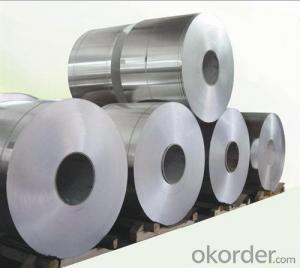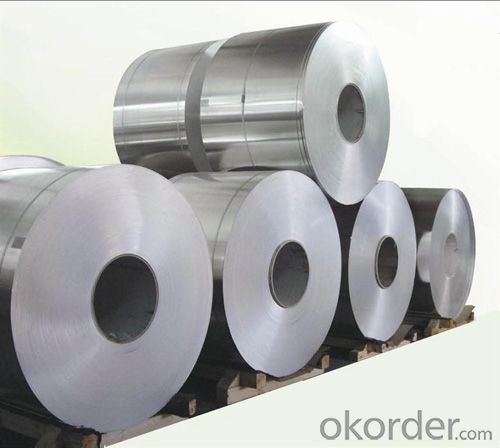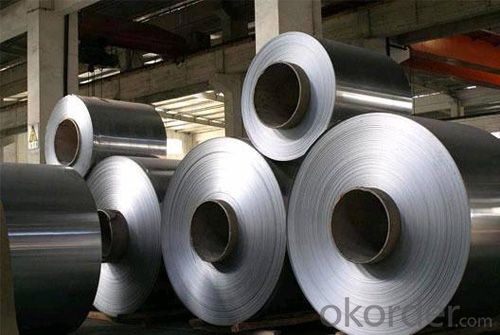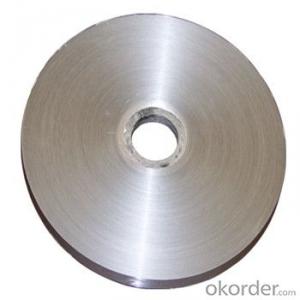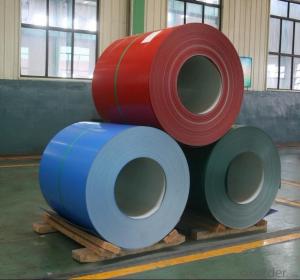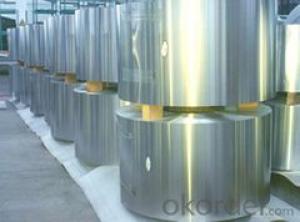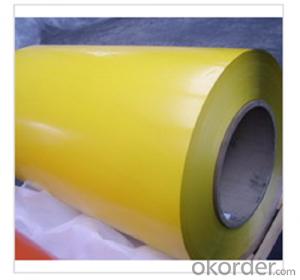Painting Aluminum Coil Stock for Industrial Applications
- Loading Port:
- China main port
- Payment Terms:
- TT OR LC
- Min Order Qty:
- 5 m.t.
- Supply Capability:
- 10000 m.t./month
OKorder Service Pledge
OKorder Financial Service
You Might Also Like
Specification
1. Specification of Aluminium Coils for Industrial Applications
Alloy: 1050, 1060, 1100, 1200, 3003, 3004, 3105, 1235, 8011, 8079, 8006, 5005, 5052, 5754, 5083,etc
2) Temper: Free
3) Thickness: ≥3mm
4) Width: 900-2300mm
5) Weight: 7-8 tons per coil
6) Dimensions and weight can be produced according to clients' specifications.
7) Inner Diameter: 505mm, 605mm
8) Packing: Export standard, wooden pallet.
9) Delivery time: 10-20 days
10) Minimum order quantity:20 tons per size.
11) The term of payment: T/T, irrevocable L/C at sight.
12) Surface: Bright
13)Origin: China
2. Feature of Aluminium Coils for Industrial Applications
*Such coil is specially designed to replace aluminum ingot, due to the high export tax of aluminum ingot, the coil has better price than ingot.
*This type of coil can fit customer's remelting furnace just like ingot, no need to make any change to the production line that was previously used for ingot. The standard coil size and weight is very suitable for the feed gate of furnace.
*This type of coil causes less material wastage than ingot when remelted.
*Our coil is made directly from ore, no need to go though the ingot making process, quality is much better than other suppliers who use ingot scrap to make coil.
Be free from Oil Stain, Dent, Inclusion, Scratches, Stain, Oxide Dicoloration, Breaks, Corrosion, Roll Marks, Dirt Streaks and other defect which will interfere with use
3. Certificate:
SGS and ROHS(if client request, paid by client), MTC(plant provided), Certificate of Origin(FORM A, FORM E, CO), Bureau Veritas and SGS (if client request, paid by client), CIQS certificate
4. Image of Aluminium Coils for Industrial Applications
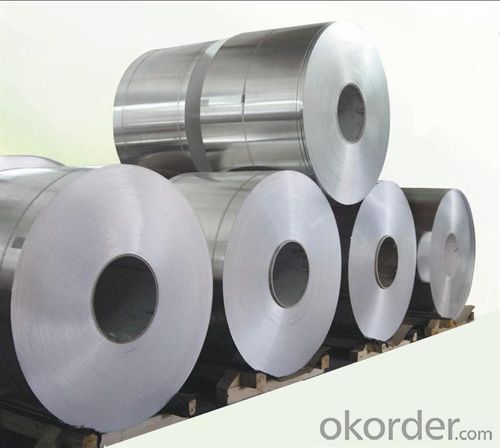
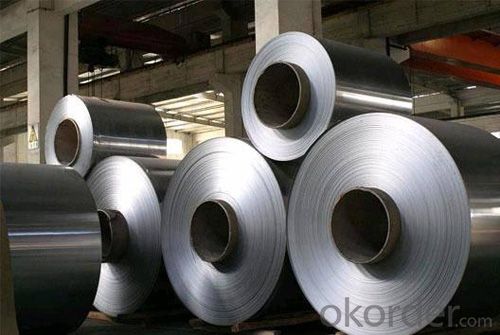
6. Package and shipping of Aluminium Coils for Industrial Applications
eye to sky
eye to wall
with wooden pallet (wooden case also available)
7. FAQ
1) What is the delivery time?
Dpends on actual order, around 20 days
2) What is the QC system:
We have QC staff of 20 persons and advanced equipment, each production is with MTC traced from Aluminum ingot lot.
3) What market do you mainly sell to?
Australia, America, Asia, Middle East, Western Europe, Africa etc
- Q: What are the common surface finishes available for aluminum coils?
- There are several common surface finishes available for aluminum coils, each offering unique benefits and aesthetic appeal. One of the most popular finishes is mill finish, which is the standard finish applied to aluminum coils straight from the mill. Mill finish provides a smooth, shiny surface without any additional treatments or coatings. Another common surface finish for aluminum coils is anodized finish. Anodizing involves an electrochemical process that creates a durable, corrosion-resistant layer on the surface of the aluminum. This finish can be clear or colored, providing a wide range of options for design and customization. A painted or coated finish is another popular choice for aluminum coils. This involves applying a layer of paint or coating onto the surface of the aluminum to enhance its appearance and protect it from corrosion. Painted finishes can be customized in terms of color, gloss level, and texture, allowing for endless design possibilities. Additionally, brushed finishes are often used for aluminum coils. This finish involves brushing the surface of the aluminum with abrasive materials, creating a pattern of fine lines or scratches. Brushed finishes offer a unique, textured appearance that can add visual interest to various applications. Laminating is another surface finish option for aluminum coils. This process involves applying a thin layer of film or other material onto the surface of the aluminum, providing additional protection against scratches, UV rays, and other elements. Laminated finishes can be glossy or matte, depending on the desired look. Overall, the common surface finishes available for aluminum coils include mill finish, anodized finish, painted or coated finish, brushed finish, and laminated finish. Each finish offers its own set of advantages and can be chosen based on specific requirements such as aesthetics, durability, corrosion resistance, and customization options.
- Q: Are aluminum coils suitable for lightweight panel applications?
- Indeed, lightweight panel applications can benefit from the use of aluminum coils. Renowned for their lightweight and corrosion-resistant properties, aluminum coils prove to be an exceptional option for these applications. With ease, aluminum coils can be molded and fashioned into panels of various sizes and thicknesses, showcasing their remarkable versatility. Moreover, the high strength-to-weight ratio exhibited by aluminum facilitates the production of robust and enduring lightweight panels. These panels find utility across a range of industries, including automotive, aerospace, construction, and transportation, where the reduction of weight is paramount. All in all, the lightweight nature, corrosion resistance, versatility, and strength of aluminum coils render them a fitting choice for lightweight panel applications.
- Q: Can aluminum coils be painted or coated after installation?
- After installation, it is indeed possible to paint or coat aluminum coils. Aluminum, being a versatile material, lends itself well to painting or coating in order to improve its aesthetics or offer extra safeguarding. Opting to paint or coat aluminum coils subsequent to installation can effectively thwart corrosion, enhance durability, and yield a personalized finish. The selection of paint or coating hinges upon the specific necessities and desired results. Prior to applying any paint or coating, it is crucial to thoroughly clean and prepare the aluminum surface to ensure strong adhesion and long-lasting results.
- Q: What are the thermal expansion properties of aluminum coils?
- The thermal expansion properties of aluminum coils refer to the way aluminum expands or contracts when exposed to changes in temperature. Aluminum generally has a high coefficient of thermal expansion, meaning it expands significantly when heated and contracts when cooled. This property allows aluminum coils to effectively conduct heat and transfer it to the surrounding environment.
- Q: Aluminum is a metal and nitrate (nitrogen) is a non metal so shouldn't they form an ionic bond and not a covalnt bond? And if it were an ionic bond wouldn't it be called aluminum mononitrate? But it is a covalnt bond (thus a molecular bond and so there is no mono in the name). Pleas help I'm very confused!
- Aluminum Nitrate Ionic Or Covalent
- Q: What's the color coated aluminum roll?
- Colour coated aluminium coil product information:Product category: polyester coated aluminum coil (PE), fluorocarbon coated aluminum coil (PVDF)Mylar coated aluminum coilIs a kind of anti UV ultraviolet coating, polyester resin is used in the main chain of ester containing polymer polymer as monomer, add alkyd resin, UV absorber according to gloss, can be divided into sub light and high light series. The utility model is especially suitable for indoor decoration and advertisement boards.Fluorocarbon coating aluminum coilFluorocarbon resin is a kind of fluorocarbon resin, which is composed of pigments, alcohols, esters, solvents and assistants. High temperature barbecue film,The molecular structure of the coating is close and has super weatherability. Fluorocarbon coatings can be divided into two kinds: traditional fluorocarbon and nano fluorocarbon coating according to the surface film forming structure.The utility model is especially suitable for the decoration and display of indoor, outdoor decoration, commercial chain, exhibition advertisement, etc. in public places
- Q: What is the lifespan of aluminum coils?
- The durability of aluminum coils is subject to fluctuation due to diverse elements like aluminum quality, manufacturing techniques, environmental circumstances, and upkeep. On average, aluminum coils persist for approximately 15 to 30 years. Yet, with conscientious attention and periodic maintenance, encompassing cleansing and examination, the lifespan of aluminum coils can potentially expand. It is crucial to emphasize that regular maintenance and professional servicing facilitate early detection of any complications, facilitating prompt repairs or replacements, and ultimately elongating the longevity of aluminum coils.
- Q: A piece of aluminum foil 0.550 mm thick and 1.00 cm square is allowed to react with bromine to form aluminum bromide?a) How many mole of aluminum were used? ( The density of aluminum is 2.699 g/cm3.)I keep getting the same answer which I know is wrong. I used a formula to get the volume and then the mass to get the moles, but maybe this is wrong. Could someone explain the process. I got 4.32 x 10-1 mol Al, but the answer is 5.50 x 10-3 mol Al.
- Okay. If you have .55mm thick, 1cm square of Al, you you have 55 cubic mm of Al. 55 cubic mm is .055 cubic centimeters of Al. .055 * denisty of Al (2.699 g/cm3) gives you .148 grams of Al. Al molecule weight is 27g/mole. So .148 g * (1 mole / 27 grams) = .00548 moles of Aluminum. That rounds to about 5.50 x 10-3 moles. I should also add that A) Remember when you are converting cubic units (such as mm3 into cm3), the conversion factor should also be cubed (so 1 cubic mm = 10^3 cubic cm). Also, not to be nit picky, but this question is dumb because aluminum foil would also have a good portion of aluminum oxide coating it...but I wouldn't bring that up to the teacher if I were you. :-)
- Q: This question asks about the impact of aluminum coils on safety and health protection during welding processes.
- <p>Aluminum coils can significantly affect welding safety and health protection due to their unique properties. Aluminum is lighter than steel and conducts heat quickly, which can lead to faster heat transfer to the welder, increasing the risk of burns. Additionally, aluminum welding produces fumes that contain aluminum oxide, which can be harmful if inhaled over time, potentially causing respiratory issues or even neurological damage. Welders must use proper ventilation and respiratory protection to mitigate these risks. Moreover, aluminum's high reflectivity can cause intense light exposure, necessitating the use of appropriate eye protection to prevent eye injuries. Overall, aluminum welding requires specific safety measures to protect welders' health and safety.</p>
- Q: How can you tell the difference between aluminum and other non-magnetic metals, such as what I've heard called, pot-metal?
- Aluminum is very light. Pot metal, also known as white metal, die-cast zinc, or monkey metal,[1] is a slang term that refers to alloys that consist of inexpensive, low-melting point metals used to make fast, inexpensive castings. There is no scientific metallurgical standard for pot metal; common metals in pot metal include zinc, lead, copper, tin, magnesium, aluminium, iron, and cadmium. The primary advantage of pot metal is that it is quick and easy to cast. Due to its low melting temperature no sophisticated foundry equipment is needed and specialized molds are not necessary. It is sometimes used to experiment with molds and ideas before using metals of higher quality. Examples of items created from pot metal include toys, furniture fittings, tool parts, electronics components, and automotive parts.[citation needed] Pot metal can be prone to instability over time, as it has a tendency to bend, distort, crack, shatter, and pit with age.[1] The low boiling point of zinc and the fast cooling of the newly-cast part often allow air bubbles to remain within the cast part, weakening the metal.[1] Many of the components of pot metal are susceptible to corrosion from airborne acids and other contaminants, and the internal corrosion of the metal often causes the decorative plating to flake off.[citation needed] Pot metal is not easily glued, soldered or welded.[1] At one time, pot metal referred to a copper alloy that was primarily alloyed with lead. 67% Cu, 29% Pb 4% Sb and 80% Cu, 20% Pb were common formulations.[2] The primary component of pot metal is zinc, but often the caster adds other metals to the mix to strengthen the cast part, improve the flow of the molten metal, or to reduce cost.[dubious – discuss] With a low melting point of 419 °C (786 °F), zinc is often alloyed with other metals including lead, tin, aluminium and copper.
Send your message to us
Painting Aluminum Coil Stock for Industrial Applications
- Loading Port:
- China main port
- Payment Terms:
- TT OR LC
- Min Order Qty:
- 5 m.t.
- Supply Capability:
- 10000 m.t./month
OKorder Service Pledge
OKorder Financial Service
Similar products
Hot products
Hot Searches
Related keywords
